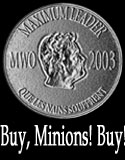NOTE:
Some of the punctuation in the cut and paste sections below have morphed into odd characters due to our blogskin. I usually go through and retype punctuation, but I’m just not up to doing this much. If it annoys you, then don’t read any further.
The LDS church today explicitly includes itself in the Christian fold.
I’ll cut and paste below, excerpting from the LDS article:
Of course we are Christians. Why would anyone say otherwise? Here are the facts.
But there are sincere people out there who believe the Latter-day Saints aren’t Christians. In fact, the accusation that we are not Christians is probably the most commonly heard criticism of the LDS Church and its doctrines today.
Why would anyone say such a thing? Isn’t the name of our church The Church of Jesus Christ of Latter-day Saints? Do we not worship Christ? Is not the Book of Mormon another testament of Jesus Christ? How could anyone seriously doubt that Latter-day Saints are Christians?
There are a number of arguments used supposedly to “prove” that we are not Christian. It is important to recognize that none of them have anything to do with whether or not Latter-day Saints believe in Jesus Christ. Rather, what they basically boil down to is this: Latter-day Saints are different from the other Christian churches. (We understand that these differences exist because traditional Christianity has wandered from the truth over the centuries, but other denominations see things otherwise.) Their arguments against the Latter-day Saints being
Christian generally fall into six basic categories:
Exclusion by special definition
1 What is a Christian?
…The term Christian may be defined in a number of ways, but the most common is “one who believes or professes… to believe in Jesus Christ and the truth as taught by him… one whose life is conformed to the doctrines of Christ.” The second most common meaning is “a member of a church or group professing Christian doctrine or belief.”
Under either of these two definitions, Latter-day Saints qualify as Christians.
…No one “owns” the term Christian or has the right to deny it to others who worship Jesus as the divine Son of God.
2 Exclusion by misrepresentation
3 Name calling has often been used in religious controversies. At one time, Catholics called Protestants “heretics,” and Protestants called Catholics “papists.” But this sort of tactic amounts to nothing more than saying, “Boo for your religion, and hurrah for mine.”
The negative term most frequently flung at the LDS is “cult,” a term which can suggest images of pagan priests and rituals. But the truth is there is no objective distinction by which a cult may be distinguished from a religion. Use of the term cult does not tell us what a religion is, only how it is regarded by the person using the term. It simply means “a religion I don’t like.”
4 Exclusion by tradition (Smallholder has left this section intact because, gosh darn it, it is interesting)
It is sometimes argued that to be truly Christian, modern churches must accept both biblical Christianity and the traditional Christianity of later history. In other words, one must accept not just biblical doctrines, but also the centuries of historical developmentv=the councils, creeds, customs, theologians, and philosophersv=that came along after New Testament times. Since the Latter-day Saints do not accept doctrines originating in the early Church after the death of the apostles and prophets, we are accused of not being v¨historicalvÆ or v¨traditionalvÆ Christians.
In fact, we believe that revelation to the early Church stopped because of the death of the Apostles and the growing apostasy, or falling away, from the truth. In the absence of Apostles, the church eventually turned to councils of philosophers and theologians, for guidance. These councils, after lengthy debates, in turn interpreted the gospel according to their best understanding. Often they drew upon the philosophies of respected men (like Plato), concluding, for example, that God has no body or physical nature; or that the three separate persons of the Godheadv=the Father, Son, and Holy Ghostv=are only one being. The declarations of these councils are still generally accepted today by traditional Christian churches as official doctrines. Yet these creeds were formulated centuries after the deaths of the Apostles and the close of the New Testament.
Were the Twelve Apostles Christians? Of course. But if it were true that one must accept the whole package of historical Christianity in order to be a Christian, then it would be impossible for early Christians, including Jesus and his disciples, to qualifyv=since they lived centuries before these traditions came to be. On the other hand, if the New Testament Saints can be considered Christians without accepting all the traditions of men that came later, then so can the Latter-day Saints, and the historical exclusion is invalid.
5 The canonical or biblical exclusion (This section intact too. It does a good job of demolishing my earlier appelation of “post-Christian” to groups that have additonal sources of revelation)
The term v¨canon of scripturevÆ refers to the collection of books accepted by any group as the authoritative word of God. For most Christians the canon of scripture is limited to the Bible. But Latter-day Saints have a larger canon of scripture that includes the Book of Mormon, the Doctrine and Covenants, and the Pearl of Great Price. The canonical exclusion, in its simplest form, says that since Latter-day Saints have books of scripture in addition to the v¨traditionalvÆ Christian Bible, they cannot be Christians.
One of the problems with this canonical exclusion lies in the assumption that there is only one v¨traditionalvÆ Christian Bible. Over the centuries, there have been a number of different versions of the Bible, and many Christian churches and individuals have disagreed about which books should be included. Even today, the Bible used by Catholics contains a number of different books than the Bible used by Protestants. Yet Catholics and Protestants continue to call each other Christiansv=even though they have different canons of scripture.
When revelation stopped after the death of the early Apostles, people were forced to draw one of two conclusions: (1) either revelation had stopped because God had already said everything they would ever need, or (2) revelation had stopped because the church lacked apostles and prophets to speak for him. Traditional Christians accept the first explanation; Latter-day Saints accept the second.
Sometimes critics cite Revelation 22:18v±19 [Rev. 22:18v±19] as evidence that the Bible forbids adding to or taking away from the canon of scripture. In these verses, John curses those who would add to or take away from v¨this book.vÆ But when John wrote Revelation, the Bible in its present form did not yet exist. He was simply referring to his own book, the Book of Revelation, rather than to the whole Bible.
The truth is that prophets have usually added to the scripturesv=almost all the biblical apostles and prophets did this. There is, in fact, no biblical statement whatever closing the canon of scripture or prohibiting additional revelation or additional scripture after the New Testament.
Some non-LDS Christians believe that the Bible contains all religious truth. However, the Bible itself says nothing of the sort. The word Bible never appears in the Biblev=for the Bible never refers to itself. Thus all these claims about the Bible are unbiblical. The Bible itself never claims to be perfect, never claims to be sufficient for salvation, and never claims to grant its readers authority to speak or act for God. Rather, such claims are made by those who have lost priesthood authority and have lost direct revelation and, instead of trying to find them again, are trying desperately to maintain that their loss doesnv t matter.
6 The doctrinal exclusion (The Maximum Leader’s focus on the Trinity here)
This type of argument claims that since the Latter-day Saints do not always interpret the Bible as other Christians do, we must not be Christians. But, in fact, other denominations also differ among themselves doctrinally, and it is unreasonable to demand that Latter-day Saints conform to a single standard of v¨ChristianvÆ doctrine when no such single standard exists.
For example, the Latter-day Saints are accused of worshiping a v¨different godvÆ because we do not believe in the traditional Trinity. v¨We believe in God, the Eternal Father, and in His Son, Jesus Christ, and in the Holy GhostvÆ (A of F 1:1) as taught in the New Testament. What Latter-day Saints do not believe is the non-Biblical doctrine formulated by the councils of Nicaea (A.D. 325) and Chalcedon (A.D. 451) centuries after the time of Jesusv=the doctrine that God is three coequal persons in one substance or essence. We do not believe it because it is not scriptural. As Harperv s Bible Dictionary states: v¨The formal doctrine of the Trinity as it was defined by the great church councils of the fourth and fifth centuries is not to be found in the New Testament.vÆ
Jesus didnv t teach the Nicene doctrine of the Trinity. The New Testament writers didnv t have any idea of it. The doctrine itself wasnv t invented until centuries later. So one canv t say the Latter-day Saints are not true Christians for not accepting it, unless one also excludes Jesus, his disciples, and the New Testament Church, who similarly did not know or teach it.
Latter-day Saints do believe that God the Father has a physical body. This view is attacked as v¨non-ChristianvÆ by critics who often cite John 4:24, which states in the King James version that v¨God is a spirit.vÆ However, since there is no indefinite article (a, or an) in the Greek language from which this verse is translated, the consensus among biblical scholars is that there should not be an indefinite article at John 4:24. It should simply read v¨God is spirit.vÆ In other words, this scripture does not limit God to being only a spirit, but merely includes spirit as one of his attributes. After all, we also read that v¨God is lightvÆ (1 Jn. 1:5) and v¨God is lovevÆ (1 Jn. 4:8), and yet no one interprets these verses to mean that God is only light, or God is only love. Certainly, the member of the Godhead called the Holy Ghost is spirit, but that fact tells us nothing about whether or not God the Father has a physical body.
Finally, quite often we hear that Latter-day Saints are not Christians because true Christians believe in salvation by grace, while the Latter-day Saints believe in salvation through our own good works. But this is a misunderstanding. Yes, Latter-day Saints do believe we must serve God with all our v¨heart, might, mind, and strengthvÆ (D&C 4:2). But the Book of Mormon makes perfectly clear that it is impossible for us to completely earn or deserve our blessings from God (Mosiah 2:21, 24); that redemption can never come through individual effort alone, but only through the Atonement of Jesus Christ (2 Ne. 2:3, 5v±8); and thatv=after all we can do (Alma 24:11)v=we are saved by grace (2 Ne. 10:24; 2 Ne. 25:23).
Conclusion
We have discussed arguments some people use for claiming that Latter-day Saints are not Christians. Notice that not one of these addresses the question of whether we accept Jesus Christ as the divine Son of God and Savior. Our critics donv t address thisv=the only issue that really mattersv=for the LDS position here is an unassailable matter of record. Our first article of faith [A of F 1:1] declares our belief in Jesus Christ. We meet every Sunday and partake of the sacrament to renew our faith in and our commitment to Him as the Son of God and the Savior of the world.
…Both the Book of Mormon as scripture and Joseph Smith as a prophet bear witness to Jesus Christ as Savior. The Doctrine and Covenants and Pearl of Great Price bear that same great witness, as do all of the modern prophets and apostles. Though all the world may say that Latter-day Saints do not know or love or worship Jesus Christ, the truth is that we do. If this is not enough to be counted as Christian, then that word has lost its meaning.



